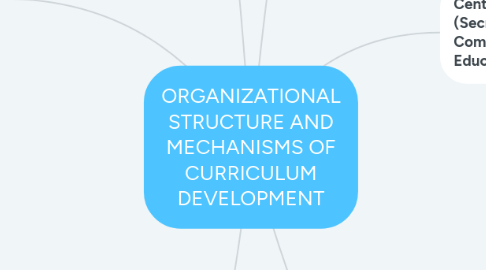ORGANIZATIONAL STRUCTURE AND MECHANISMS OF CURRICULUM DEVELOPMENT
作者:TESLE-0617 Nur Alya Anis Binti Mansor

1. State Curriculum Committee.
1.1. to monitor, assess and guide principals, headmasters and teachers in the implementation of the curriculum;
1.2. to gather and analyze information and take the necessary follow-up action;
1.3. to co-ordinate the implementation of activities between policy makers and implementers at the Ministry, division/district and school levels;
1.4. to co-ordinate the use of resources for curriculum implementation;
1.5. to plan, manage and co-ordinate courses organized for teachers by the State Education Department;
1.6. to plan, manage and implement innovative projects;
1.7. to improve professionalism among teachers.
2. School Curriculum Committee.
2.1. to plan, organize and evaluate teaching/learning activities in schools;
2.2. to work towards increasing the knowledge and competence of teachers and students;
2.3. to study the suitability of the subject content and inform parties concerned;
2.4. to study, evaluate and determine the suitability of textbooks or other materials;
2.5. to assess the scheme of work;
2.6. to assess pupil performance and to identify follow-up action;
2.7. to plan and conduct in-house training programmes for all teachers;
2.8. to disseminate information to all teachers on the latest progress and development in education;
2.9. to produce more educational resource materials in schools;
2.10. to identify suitability of educational electronic media programmes in teaching-learning activities;
2.10.1. to co-operate in the on-going assessment in schools;
2.11. to co-ordinate additional learning activities.
3. Educational Planning Committee. (Secretariat: Educational Planning and Research Division, Ministry of Education.)
3.1. to approve and formulate the major policies in the Ministry of Education;
3.2. to consider all projects related to policy matters.
4. Central Curriculum Committee. (Secretariat: Central Curriculum Committee, Ministry of Education.)
4.1. to formulate curriculum policies, as well as study their implications;
4.2. to determine the direction of curriculum development and co-ordinate efforts to achieve this goal;
4.3. to consider and make recommendations concerning education planning and implementation, as well as to present these findings to the Educational Planning Committee;
4.4. to study the implications of curriculum programmes and to make decisions accordingly;
4.5. to determine aspects which require research and study.
5. Curriculum Implementation Committee (Secretariat: Central Curriculum Committee, Ministry of Education.)
5.1. responsible for coordinating all levels of preparation in implementing any curriculum programmes approved by the Central Curriculum Committee;
5.2. to ensure co-ordination between the divisions of the Ministry and the State Education Departments in the implementation of the curriculum;
5.3. to gather feedback on curriculum implementation at the State, division/district and school levels;
5.4. to organize forums to discuss successful innovative programmes implemented at the State level.
6. Division/District Curriculum Committee.
6.1. to plan activities and curriculum implementation strategies at division/district levels;
6.2. to arrange and organize courses and seminars to disseminate the latest information to teachers and all personnel concerned;
6.3. to advise and guide teachers in curriculum implementation;
6.4. to monitor, supervise and evaluate the implementation of the curriculum;
6.5. to provide feedback to the higher authorities on the implementation of the curriculum;
6.6. to plan, manage and implement innovative projects at the division/district levels.


